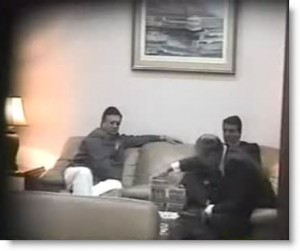
Justice Minister Aurelio Pastor said Wednesday a full review will be made of the medical reports used to justify the pardon granted last December to former TV owner José Enrique Crousillat, who took millions of dollars in bribes in exchange for favorable coverage of the Fujimori regime in the 1990s.
“We are going to ask for a new assessment of the medical tests,” state-run news agency Andina quoted Pastor as saying. “We have asked for the support of the Ministry of Health to recommend experts that, based on the reports in the file, will provide additional information to the executive branch and the president.”
President Alan García granted a pardon to the former owner of America Television on Dec. 11 for “humanitarian reasons,” on the grounds that Crousillat, 77, suffers from a series of ailments, including heart disease, depression and diabetes, which could put his life at risk.
Crousillat and his son, José Francisco, fled to Argentina in 2001 when video tapes recorded in the National Intelligence Service, SIN, proved the wide corruption network that ex-President Fujimori and his spy chief Vladimiro Montesinos had woven to control the media and public opinion. Early in 2006, the Crousillats were extradited to face trial in Lima.
Crousillat was sentenced to eight years in prison and charged a fine of $52 million, convicted of “selling” America Television’s editorial line to the Fujimori government in the 1990s. Two videotapes, recorded in the SIN offices in 1999, show Crousillat and his son receiving bundles of dollar bills from Vladimiro Montesinos. In one recording, on Feb. 26 that year, Montesinos counted the $100,000 packets to make up $1 million, “for January and February.” Crousillat and his son received about $619,000 a month to broadcast the news as dictated by Montesinos.
About a month after he was pardoned by President García, however, IDL-Reporteros, a non-profit investigative reporting team, published a picture of Crousillat, who appeared to be in good health during a recent visit to a beach. Crousillat had also been seen in good condition at popular restaurants.
Furthermore, Crousillat filled a lawsuit last Monday against the current directors of America Television in an attempt to regain control of the station, Crousillat’s lawyer, Jorge Castro, told Radio Programas Peru. Castro said former president Alejandro Toledo is also included in the lawsuit. He accuses them of, among other things, collusion and fraud.
“One begins to feel that he has been deceived, because a person that is in the final stages of their health is not at the beach… or at the Costanera restaurant,” President García told daily El Comercio.
Critics of García, however, question his sincerity and point to his relationship with Crousillat’s daughter, Marisol, who was named to a top position at the government-owned National Institute of Radio and Television of Peru, or IRTP, in July 2009. Marisol Crousillat was appointed to the position by then-president of the IRTP, Ricardo Ghibellini, a confidant of García who was named ambassador to Brazil by the president in February.
“For me it is a mistake to suggest that this is a product of a deceived president. Those who believe that do not know our president,” former anti-corruption prosecutor, Antonio Maldonado, told Ideele Radio. “I don’t think that our president is so naive as to be tricked. This is part of a much more complicated sketch.”
“We have to be clear. The pardon given to José Enrique Crousillat is the largest betrayal of the fight against corruption in recent times. The pardon should be revised, it should be part of a national and international campaign for its revision. It should be annulled.”
Economics Prof. John McMillan and Pablo Zoido, a Ph.D. student in Political Economics, from Stanford University’s Graduate School of Business, published a paper in 2004 demonstrating the priority that Montesinos placed on Peru’s media in his campaign to control the nation’s democracy. The study, titled “How to Subvert Democracy: Montesinos in Peru” detailed how television owners were paid bribes about 100 times larger than what judges or politicians received. Control of the Fourth Estate was the key to successfully gutting the democratic system of checks and balances.





